Next week: Alena Guest will talk to us about clinical hypnotherapy.
President John Cottle opened the meeting with the Pledge of Allegiance.
Thought for the Day: “What do we live for, if not to make life easier for each other?” -George Elliott
Guests: Mark Innes, Cathy Innes, Beverly Engelhardt, Dianne Semans, Bob Edwards, Dr. William Rohr.
Visiting Rotarian: Bill Eames. Also, Helmut Clemm joined us from his 60-person Rotary Club in Munich, Germany, where the region of Bavaria has doubled the number of Rotary clubs over the last 10 years (with more than 100 now!). They had to divide their district in half to better handle its administrative needs. They’ve just started to accept women members. His kids and grandkids live in Los Gatos; this is his first visit to Mendocino.
Happy Dollars:
– Jerry is happy that Donna S. gave him extra care and attention while he was a patient in the hospital.
– Frank is happy to have his wife Beverly here with him today.
– Guenter is happy that his sister from Vienna visited and spent several days with him. She will track down what Mozart was drinking (something we are now all eager to learn…).
– Tom is happy to see Jerry back. Hooray!
– Ray is happy for resourcefulness of Gary, who enabled poker night to carry on during a power outage.
– John C. is happy that his new boss (hospital CEO Bob Edwards) is here, and that the hospital has emerged from bankruptcy.
– Harold was happy to receive services from ambulance and local firefighters (though not happy that he needed the services), and got to go to the hospital due to a-fib. He’s back to normal and feeling good.
Sunshine Report:
Wilma reported that Joe S is finally feeling better!! Hopefully we’ll see him soon at our meetings. We’re all happy to have Jerry back, after 74 days in hospital.
Announcements:
Rotary Friendship Exchange – 5 couples are coming from India — we need hosts for one or two couples May 26 and 27. Please let John C. know if you can offer overnight accommodations.
The Ford House progressive dinner deadline for registration is next week; the event itself is May 2.
Today’s Program:
John Innes introduced Dr. William Rohr, MCDH Board member, to talk about the Mendocino Coast District Hospital and its Board of Directors. Dr. Rohr earned his undergraduate degree in engineering, his masters degree in engineering and MD of orthopedic surgery. He holds numerous patents. He is also a licensed commercial fixed wing and helicopter pilot, and an accomplished photographer.
But first, John asked two Finemaster questions:
When did the MCDH Healthcare District form? January 1967.
When did MCDH first open its doors? June 26, 1971.
Dr. Rohr started his presentation by saying that the MCDH Board has a commitment to more open discussions with community, to build trust. He says the 5 Board members are working very well together, and a major accomplishment since January is that they hired a new CEO, Bob Edwards (present in the audience today).
Dr. Rohr shared much data, including that there are 2000 rural hospitals in the US, which serve 72 million US residents. These hospitals tend to be the 1st or 2nd largest employers in these communities. Remote hospitals have high fixed costs, and a higher percentage of Medi-Cal or uninsured patients, and a higher proportion of older patients compared to urban hospitals. The Accountable Care Act is not a good thing financially for our hospital, in Dr. Rohr’s opinion, as most newly insured people are enrolled in Medi-Cal, one of our lowest payers. Rural hospitals make up 50% of hospitals, but account for only 12% of healthcare spending.
Rural hospitals see sicker patients (mostly due to the age of the population). Rural hospitals see more outpatient services as a proportion of total gross revenue, as compared to urban hospitals. This results in lower revenues for the rural hospitals.
Medicare shortfalls (payments that do not cover the costs of providing care) are greater for outpatient, home health and skilled nursing facilities and services. Most rural hospital revenues come from Medicare and Medi-Cal patients. In CA, the private insurance companies pay a fraction of what Medicare pays.
Additional challenges face us here on the coast: recruiting newer, younger physicians to our area is difficult. There is a shortage nationwide of family physicians. They’re having trouble recruiting to our rural health clinic, for example.
The numbers of patients treated at MCDH have been fairly constant over time, so our hospital’s financial troubles are not due to a lower patient census. Dr. Rohr talked about the declining patient census, and the boost due to adding the new ophthalmologist. He shared data on outpatient visits, and inpatient revenues, and contractuals/gross total revenue (what the insurance will pay, which is about 53% of charges).
Dr. Rohr talked about having to consider saying “no” to insurance providers that are unwilling to pay sufficiently. He and the Board are pushing back on the insurance companies; for example, they are fighting to get paid 100% of costs for providing VA services — by not allowing the intermediary, Blue Cross, to skim 10% off the top.
The hospital’s expenses are going up too fast, according to Dr. Rohr. They are analyzing the reasons for this, and will work with the new CEO, Bob Edwards, to correct this trend. There were a bunch of unbudgeted expenses early this year, which account for part of the increased expenses. The Interim CEO and CFO positions were unbudgeted, for example. North Coast Family Health Center (NCFHC, the hospital’s clinic) has lost some providers, so that predicted revenues are not materializing. They’ve started the pharmacy related 340B program, which generates additional pharmacy revenues.
Yes, Dr. Rohr says, we’re coming out of bankruptcy, and yes things are improving, but we’re not out of the woods yet.
The LAIF fund (fund for a rainy day) has about $4.7 million in it. However, $2.6 million needs to stay in the account to cover existing bond obligations. MCDH must pay $776,900 to get out of bankruptcy. There are some other expense obligations that come from this fund as well. So, we don’t have a big cushion in our reserve fund.
Dr. Rorh shared that the Board has found a new resource to compare our hospital’s metrics against other Critical Access Hospitals throughout the country. This comparison can help the Board figure out where to focus their efforts for improving our hospital’s financial situation.
The Board is doing a department-by-department analysis and reviews with managers. They are also performing capital budget reviews. The existing hospital building needs to go away by 2030, when it will be out of compliance with seismic standards. So, we’ll need to find the money as a community to build a new facility. The new facility can be better configured to fit how medicine is practiced today, with a focus on outpatient services, ER services and better structuring of OB services. The shift is to outpatient services: the clinic (provider-based rural health clinic), and subspecialties focused on critical needs of the community: cardiology, oncology, and pulmonary (we have oncology covered now, but not the other two to a significant extent).
Dr. Rohr said the Board feels good because they are now addressing the problems. He’s appointed new people to the finance committee.
Q&A
Most other small independent hospitals have parcel tax support.
Board members are Dr. Rohr, Kitty Bruning, Dr. Peter Glusker, Sean Hogan and Tom Birdsell.
Today’s Raffle Winners: Bob Edwards, and Frank Engelhardt. No one drew the joker yet, so the pot continues to grow!

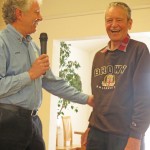
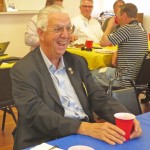
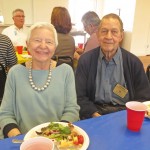
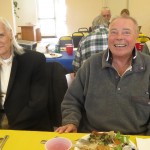
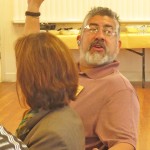
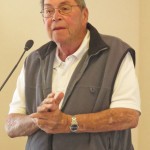
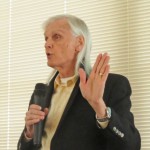
Leave A Comment
You must be logged in to post a comment.